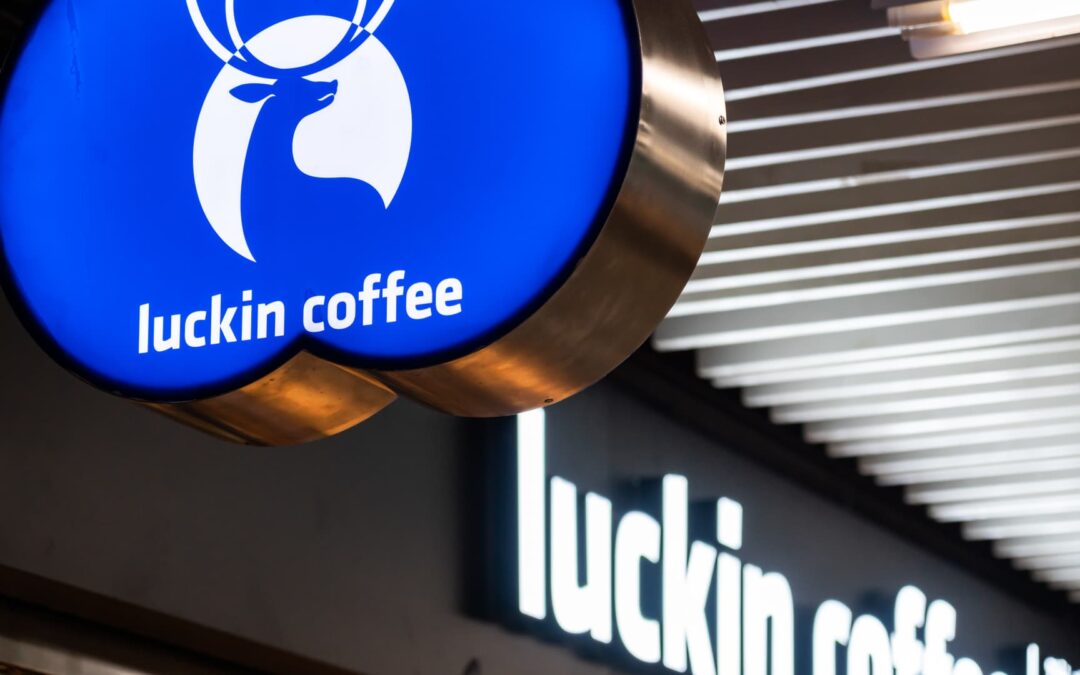SHENZHEN, CHINA – 2020/10/05: Chinese coffee shop chain Luckin Coffee logo seen at a store. (Photo by Alex Tai/SOPA Images/LightRocket via Getty Images)
Sopa Images | Lightrocket | Getty Images
Chinese coffee giant Luckin Coffee hit 10,000 stores in China in June, surpassing Starbucks as the largest coffee chain brand in the country following rapid nationwide expansion this year.
Founded in 2017, Luckin Coffee burst onto the Chinese coffee scene to challenge Starbucks through affordable coffee options and mobile ordering. China is Starbucks’ second-largest market after the U.S.
Luckin Coffee grew to 10,829 stores in China at the end of June, surpassing Starbucks as the largest coffee chain brand in the country following what one analyst calls an “aggressive” expansion. In comparison, Starbucks operated 6,480 stores in mainland China at the end of the second quarter.
“They are very aggressive in store expansion and in China, it is very common to buy a drink from Luckin for $2 or less after heavy discounts,” said Jianggan Li, founder and CEO of tech research company Momentum Works.
Luckin stores are also of a smaller format compared to Starbucks, which has much larger stores.
Rahul Maheshwari
Early-stage investor
China is traditionally a tea-drinking market, but over the last few years, coffee sales have been increasing steadily, especially in urban areas and among younger professionals.
China’s overall coffee sales will rise at an 8.7% compound annual growth rate (CAGR) from 2022–2027, according to analytics firm GlobalData. CAGR is a measure of investment returns, which takes into account what an investment yields at an annual rate over a specified period.
Aggressive expansion
In the quarter ended June 30, Luckin Coffee opened 1,485 new stores, averaging 16.5 new stores daily. Of the 10,829 stores in China, 7,181 are self-operated and 3,648 are partnership stores, according to the company’s earnings transcript.
The Chinese coffee chain expanded to Singapore in March in its first international foray and has opened 14 stores in the city-state so far, according to a CNBC check.
Cumulative transacting customers surpassed 170 million, while average monthly transacting customers reached 43.07 million in the second quarter, according to the company.
“Luckin was able to expand so fast because of its operating model — which includes self-operated stores and franchises,” said Li of Momentum Works.
Meanwhile, Starbucks’ stores worldwide are company-owned and the American coffee chain does not franchise operations, according to its website. Instead, it sells licenses to operate. In the quarter ended July 2, the company opened 588 new stores — about 40% of Luckin’s count.
Vivian Leung, an office worker residing in Guangzhou, said that there are at least two Luckin Coffee outlets within 50 meters from her apartment.
TIANJIN, CHINA – 2023/07/24: Customers are waiting in front of the counter.
Zhang Peng | Lightrocket | Getty Images
“Franchising unlocks very fast growth because you don’t have to put that amount of capital. Otherwise you will always be limited from growth. The density of Luckin stores is so high where there’s a store in almost every neighborhood,” said Rahul Maheshwari, an early-stage investor in Asia. He previously worked in Beijing at a Chinese venture capital firm and as a general manager with a Chinese app.
“Luckin stores are also of a smaller format compared to Starbucks, which has much larger stores,” said Maheshwari.
Luckin found mass market appeal. Price wise, it is already differentiated from Starbucks. Quality wise, it’s still better, compared to many of the low end brands.
Jianggan Li
Founder and CEO at Momentum Works
“As you can imagine, the asset-heavy model is expensive to operate and slow to scale,” said Momentum Works in a report.
Luckin operates a grab-and-go model, where customers order from the app and pick up their orders at the store, unlike Starbucks which offers a cozy environment for people to work and socialize.
As a result, Luckin has lower operating costs and can “break even within a year,” said Maheshwari.
Mass market appeal
Luckin and Starbucks have different pricing strategies.
A cup of coffee from Luckin costs 10 to 20 yuan, or about $1.40 to $2.75. That’s because Luckin offers heavy discounts and offers. Meanwhile, a cup of coffee from Starbucks is priced at 30 yuan or more — that’s at least $4.10.
“Luckin found mass market appeal. Price wise, it is already differentiated from Starbucks. Quality wise, it’s still better, compared to many of the low end brands,” said Li.
According to Guangzhou resident Leung, she said that Luckin Coffee is “delicious and affordable.”
Luckin is also looking to collaboration and partnerships to raise the profile of its brand.
Last Tuesday, the company launched a new drink with Kweichow Moutai, a Chinese liquor maker famed for its “baijiu,” or white liquor made from rice grains.
The Chinese coffee chain said that it sold 5.42 million Moutai alcohol-infused lattes on the first day of its launch.
Moutai, sometimes called maotai, is a premium distilled Chinese liquor and has been dubbed the “national liquor of China.”
Moutai topped the list of spirits brands with a value of $42.9 billion, according to a 2022 study by valuation consultancy Brand Finance.
Shawn Yang, managing director at Blue Lotus Research Institute, said it was a strategic move to “offer premium products to offset the sense of cheapness from 9.9 yuan per cup.”
“Luckin [extended its] customer base by leveraging the influence of legacy Chinese brands, including Moutai and Coconut Palm,” said Yang in a report.
Other localized hits with the Chinese market include brown sugar boba latte, as well as cheese latte and coconut latte.
“Luckin Coffee has played an important role in deepening the coffee market in China by introducing products which would suit the Chinese customer,” said Maheshwari in a recent blog post.









